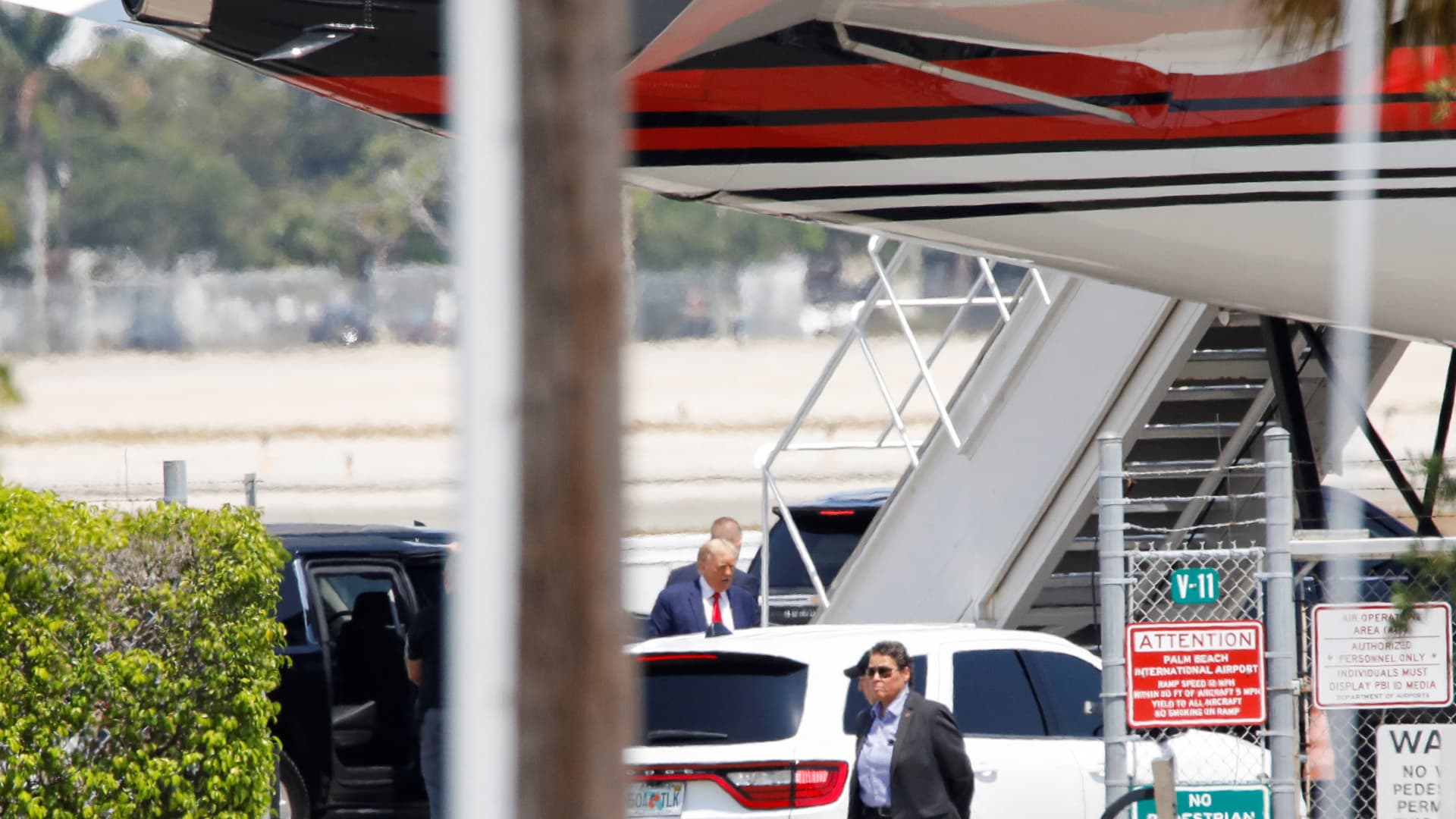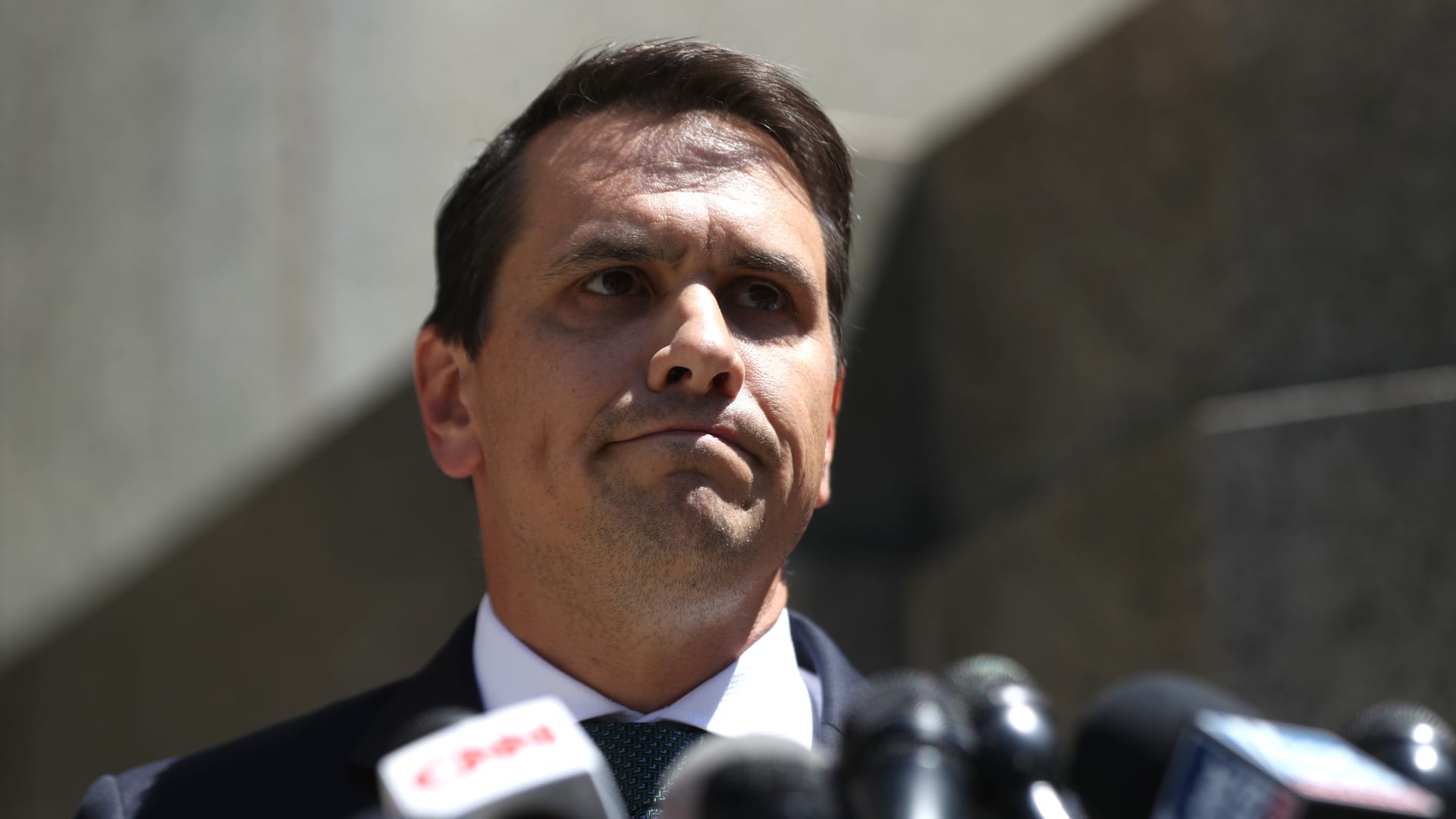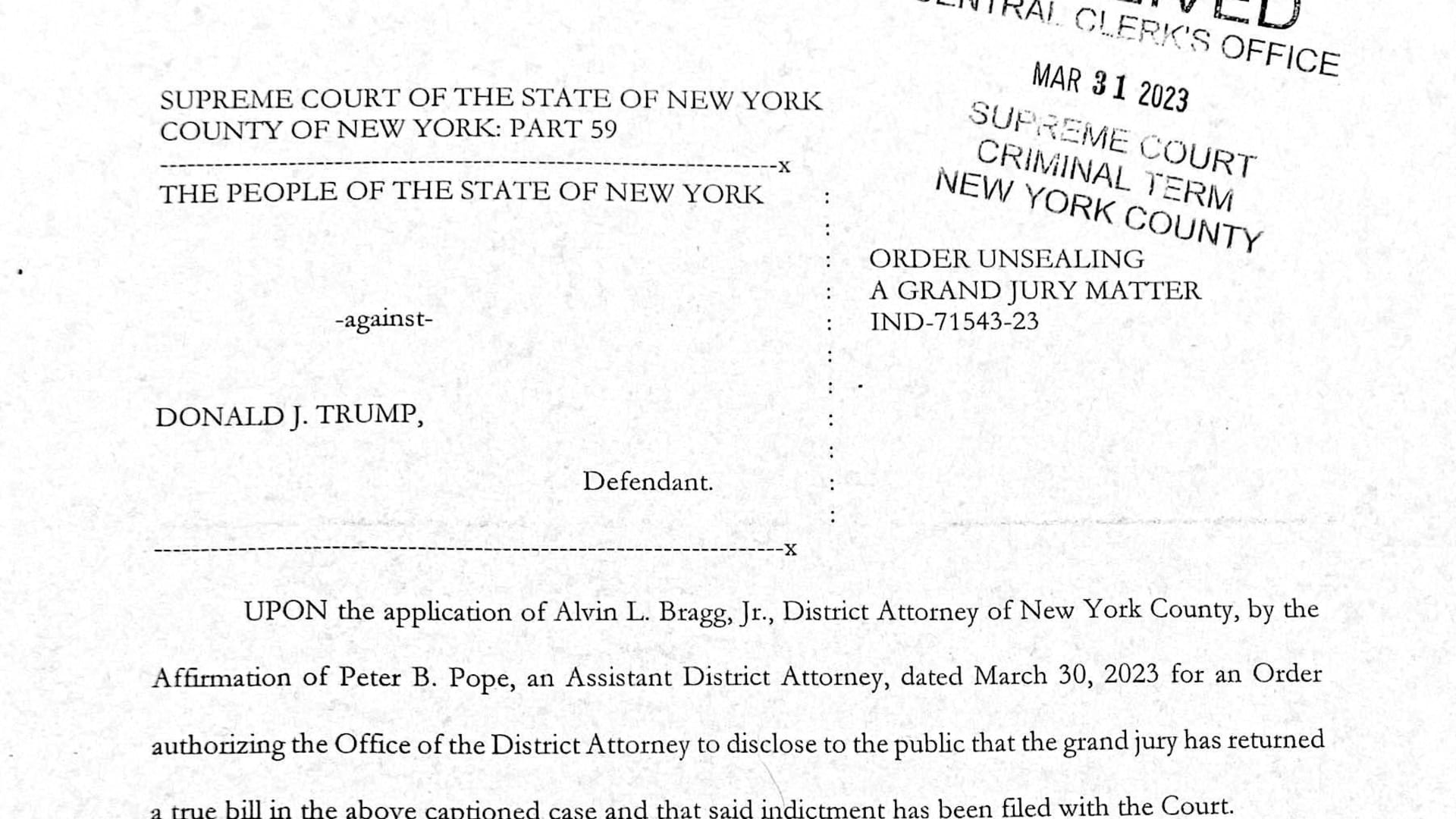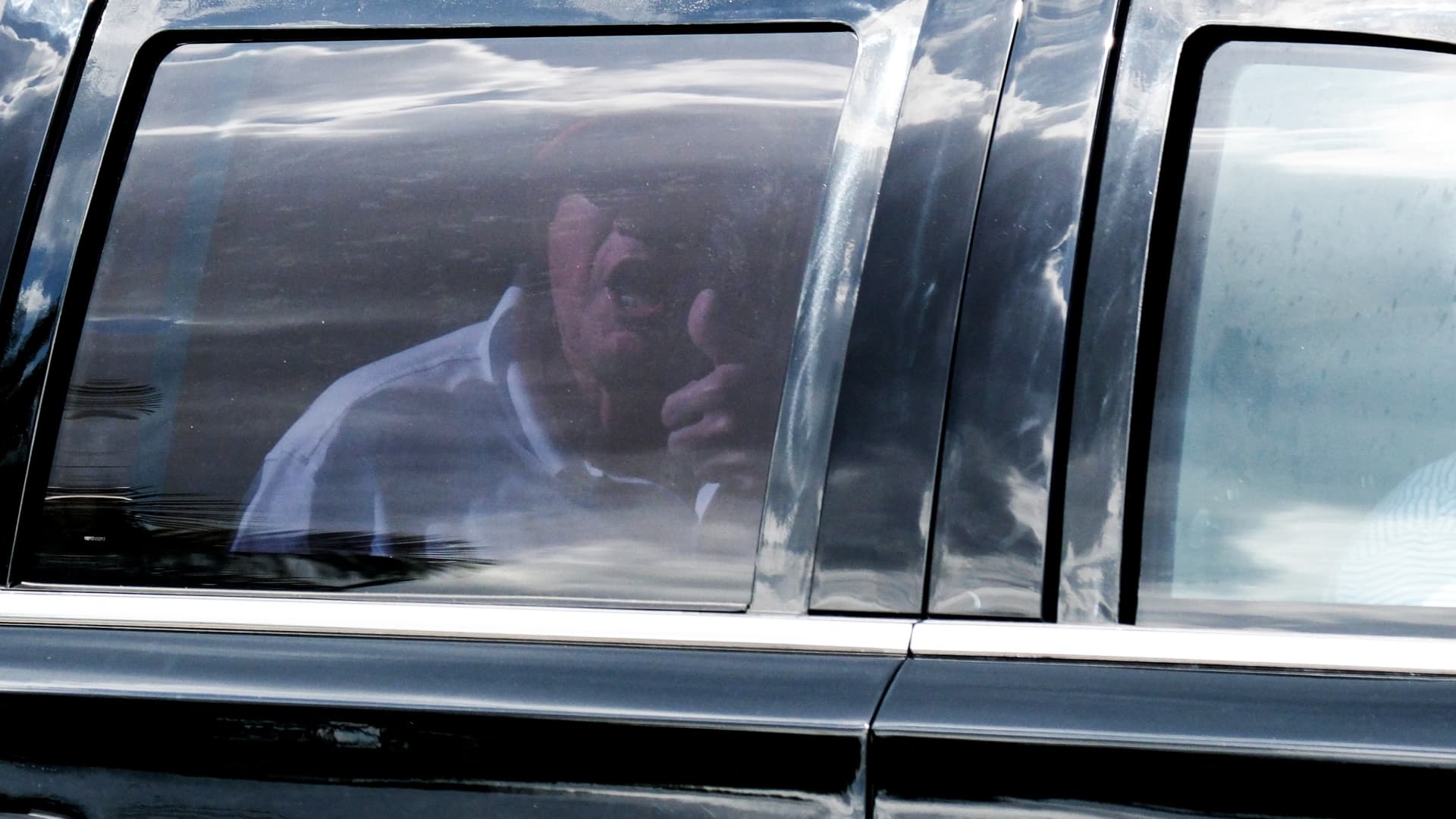
- Former President Donald Trump flew to New York's LaGuardia Airport to surrender to face criminal charges related to a 2016 hush money payment to porn star Stormy Daniels.
- Trump is due to be arraigned Tuesday in Manhattan Supreme Court, where a grand jury indicted him last week.
- His campaign for the 2024 Republican presidential nomination has raised more than $5 million since the indictment.
- Trump's former lawyer Michael Cohen was a key witness in the investigation by the office of Manhattan District Attorney Alvin Bragg.
Former President Donald Trump landed at New York's LaGuardia Airport on Monday to surrender to face criminal charges related to a 2016 hush money payment to porn star Stormy Daniels.
Trump is due to be arraigned Tuesday in Manhattan Supreme Court, where a grand jury indicted him Thursday.
"On Tuesday morning I will be going to, believe it or not, the Courthouse," he wrote in a Truth Social post from his residence in Palm Beach, Florida, late Sunday night.
"America was not supposed to be this way!" Trump added.
Trump left Mar-a-Lago at around 12:20 p.m. ET in a motorcade of SUVs, which were carrying his son Eric and his Secret Service protection detail among others. A small group of Trump supporters gathered Monday morning outside the club, waiting for his departure.
Supporters with Trump-themed flags and signs also lined part of the route as Trump traveled from Mar-a-Lago to Palm Beach International Airport, according to a video posted by Eric Trump.
Money Report
His private Boeing 757 plane — bearing the word "Trump" in large letters on its side — took off at 12:59 p.m. ET and landed at LaGuardia before 3:30 p.m. ET.
Shortly before the plane left the ground, Trump sent another Truth Social post calling the indictment a "WITCH HUNT."

The former president has said he will give a speech Tuesday night about his criminal case after he returns to his Mar-a-Lago club in Florida.
As Trump was flying Monday, the attorney Todd Blanche announced that he had joined two other criminal defense lawyers, Joseph Tacopina and Susan Necheles, on Trump's legal team for the case.
Blanche is a former federal prosecutor who previously represented Trump's one-time 2016 campaign manager Paul Manafort in his own criminal case. Blanche told NBC News he had resigned from the law firm of Cadwalader, Wickersham and Taft to represent Trump.
"I have been asked to represent Trump in the recently charged [Manhattan] DA case, and after much thought and consideration, I have decided it is the best thing for me to do and an opportunity I should not pass up," Blanche told NBC.

As Trump traveled to New York and bolstered his legal team for the case, both the Secret Service and officials in Manhattan were preparing for how to handle a unique spectacle — the first-ever arraignment of a former U.S. president on criminal charges. In a statement Monday, the head of the Secret Service's New York field office said, "While operational security precludes us from going into specifics, we will not seek any special accommodations outside of what would be required to ensure the former president's continued safety."
"Decisions around courtroom access and related procedures are determined by court officials, and we are working closely with our law enforcement partners to minimize disruptions to the normal court process, while ensuring our protectees remain secure," said Special Agent in Charge Patrick Freaney. "We have the utmost trust and confidence in the New York State Court officers and New York City Police Department."
The New York Police Department and other law enforcement agencies also continued preparations for Trump's arrival and potential protests.
On Sunday afternoon, news camera crews already had set up posts outside Trump Tower on Fifth Avenue in Manhattan and outside the courthouse, located less than four miles due south of Trump's residence.
Sources have told NBC News that Trump faces about 30 counts of document fraud in the indictment. It came after the grand jury heard multiple witnesses since January testify about a $130,000 payment Trump's then-lawyer and fixer Michael Cohen made to Daniels shortly before the 2016 presidential election.
The indictment has not been unsealed, so it is not known whether those counts are the entirety of the case.
Manhattan District Attorney Alvin Bragg, whose office is prosecuting Trump, has not made any public statement about the charges other than confirming the indictment was filed.
Cohen's payment to Daniels was designed to keep her from talking to the media about her claim that she had sex with Trump one time in 2006, months after his wife Melania gave birth to their son Barron.
Trump denies having sex with Daniels, whose real name is Stephanie Clifford. He also denies any criminal wrongdoing.

But he reimbursed Cohen with multiple payments, which in total far exceeded the $130,000. The extra amount Trump gave Cohen was at least in part to cover the income taxes the lawyer would have owed for getting the money from him.
The reimbursement was recorded as legal expenses in Trump Organization business records.
Under New York law, misclassifying the nature of business expenses in official records is a misdemeanor. But it can be charged as a felony if the misstatement was done to cover up or hide another crime.
Cohen pleaded guilty in 2018 to federal criminal charges, which included a campaign finance violation that was related to the payment to Daniels. He admitted Trump directed the payment to prevent Daniels from making her claim public, which could have potentially harmed his chances of winning the election.
Trump's campaign for the 2024 presidential election has leveraged the renewed attention to rake in money from the former president's supporters. On Monday, senior Trump aide Jason Miller said the campaign has raised $7 million since Trump was indicted.
As Trump tries to secure the GOP presidential nomination for a third time, his legal risks go beyond the hush money case. He faces three other criminal investigations.

One, by a state prosecutor in Atlanta, is focused on efforts by him and his allies to get Georgia officials to overturn his 2020 election loss to President Joe Biden in that state.
The Department of Justice is investigating Trump for his attempt to reverse Biden's national election win, by, among other things, pressuring his Vice President Mike Pence to refuse to confirm the Electoral College results during a joint session of Congress on Jan. 6, 2021. That probe also is examining whether Trump committed crimes related to the riot by a mob of his supporters who invaded the Capitol that day.
The DOJ separately is investigating Trump for potential crimes in retaining hundreds of government records at Mar-a-Lago, some of them highly classified, after he left the White House. It is also probing whether he obstructed justice in refusing to return the documents when authorities requested them.
The Washington Post on Sunday reported that "federal investigators have gathered new and significant evidence" that after Trump's advisors were sent a subpoena last May demanding the return of documents bearing classified markings, "Trump looked through the contents of some of the boxes of documents in his home, apparently out of a desire to keep certain things in his possession."
Trump has denied committing crimes related to any of the probes, which he argues are motivated by a desire to harm him politically.
Follow our live coverage of former President Donald Trump's surrender and arraignment at the Manhattan criminal courthouse.






